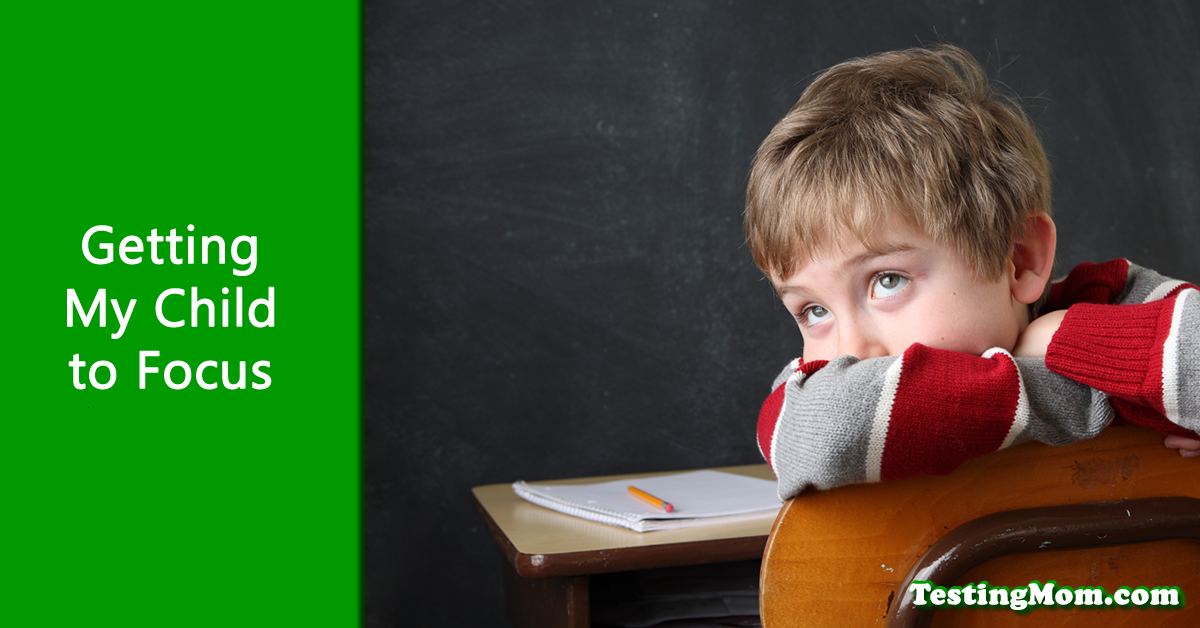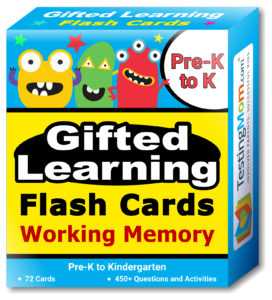› Getting My Child to Focus
Getting My Child to Focus
posted by Karen Quinn, The Testing Mom - May 15th, 2019
Distracted Cycle

It seems there’s always so much to do, and with so much stimuli around us in our multi-tasking mentality, it seems we are constantly distracted. It’s getting harder and harder to focus on anything for any substantial amount of time.
Focus for Preschoolers
Kathleen Kannass, Ph.D., associate professor of developmental psychology at Loyola University Chicago, found in her research that “an average two-and-a-half-year-old can focus on a toy for only about four minutes — roughly a third as long as a typical four-year-old might.” For a curious young child, the world is simply too exciting to stay focused on a single activity! Since he is still learning how to pay attention (as with walking and talking), each child’s attention span develops at an individual rate.
But, attention isn’t just one skill…it’s actually a set of three learned skills: focus, awareness and executive attention (planning and decision-making). So if paying attention is a skill that’s learned, how do parents teach their children this much-needed life skill?
Three Learned Skills
Focus
For starters, try not to multi-task around your child, because this only allows you to offer your child “partial attention,” which can undermine your relationship. Instead, try to focus together with your child, whether it’s simply making dinner conversation or building a Lego tower, because doing things together creates joint attention. If you can get your child to focus long enough to finish the tower (or any other task) that requires time, focus and patience, he’ll become better at persevering through many other of life’s unpleasant waiting periods, whether it’s at the post office, doctor’s office or in checkout lines!
These days, multi-tasking has sadly become our way of life – and kids are no exception. “Sixty percent of kids ages eight to 18 multi-task at least some of the time when they’re doing homework.” Sadly, this is not conducive to learning because alternating tasks slows us down due to the brain’s need for time to switch between tasks, then to focus or refocus on the new task at hand. Multi-tasking can also inhibit deeper learning, which means that “kids might do well on homework, yet learn the material less well.” With that said, it’s best to teach kids to focus on a single task in order for them to learn and grow.
So with all of our worldly distractions, how can we possibly teach focus? Well, quieting as many of the distractions as possible is a great first step in creating an arena for focus.
Awareness
Secondly, children learn to focus by their senses of sight and sound, so strengthening those senses is a profound way of teaching focus. You can start by taking a silent “listening walk” around your house, neighborhood or park, pointing in the direction of sounds to help your child concentrate. At the end of the walk you can discuss what each of you heard, possibly making it into a game with prizes for the one who hears the most things. And the next time you walk through the same area, you can try a silent “watching walk” instead. The key in both instances is to be silent so that you focus solely on one sense. These are easy, yet powerful games, and you’ll be amazed at what you each discover when you stop to “smell the roses of life!”
Speaking of sounds, adults are much better at tuning out noises than young children are. Jennifer Weaver, a licensed clinical social worker who works with young children in the Washington, D.C., area, states that, “Many toddlers tend to hear things a little louder than adults do. Also, textures are a little scratchier and smells are a little stronger.” Who knew? Although your child will eventually learn to ignore such distractions, you should initially try to minimize them by ensuring that the TV is off and that there’s no music on or that the music is soft and soothing, because soft music can help mask distracting sounds – especially if you live in a high-noise urban city.
Executive Attention
Lastly, try to avoid over-scheduling your child. I know, I know, we all want to teach our children every possible skill on the planet so that they’ll have a myriad of future opportunities, but an over-scheduled child is an overwhelmed child! So, try to allow for downtime in between activities to allow your child’s mind to recover. In fact, I had a parent of a four-year-old beg me for guidance on how to get her child to change activities (I’d never been asked this question, so I was intrigued). It seemed that every time her child was focused on something and was enjoying it, the mom would receive LOUD resistance when it came time to leave it. Whether it be leaving the park, a play date or grandpa’s home, her daughter would exhibit a literal meltdown each time, to no avail.
That’s when I suggested that she offer up an “advance notice” of the change that would be taking place, such as: “Charlotte, we will be leaving the park in five minutes, so make sure you go down the slide one more time!” This way, her child’s brain could begin to switch focus from one activity to something new (and potentially equally fun), thereby making the situation less stressful. And I’m happy to say that the meltdowns diminished over time once the mom instituted this newfound “warning time.” It makes the transition easier, and allows your child to refocus on a new task faster.
I also recommend adding other fun focus games that encourage observations within your daily routine.
Remember those dreaded, yet ubiquitous long waiting lines that we inevitably endure in our daily lives? Well, we know they can turn even the most tolerant child into a grouchy, cantankerous kid in a matter of seconds if you haven’t already worked on these skills. So, the next time you’re standing in line at the post office, play a game where you challenge your child to spot people wearing glasses or carrying phones or wearing blue sneakers (or whatever else you can come up with). While you’re at the grocery store, have him hunt for fruits, veggies or foods of a specific color, etc.
Remember, the ability to focus is like a muscle. So, with time and practice, a child can build longer and more effective periods of concentration while staying on-task.




Tell us about your experiences